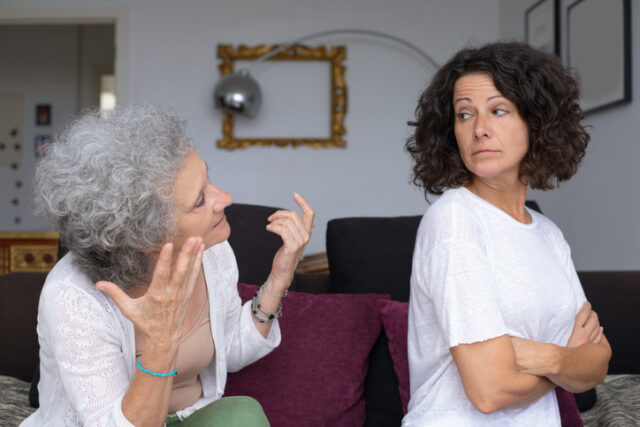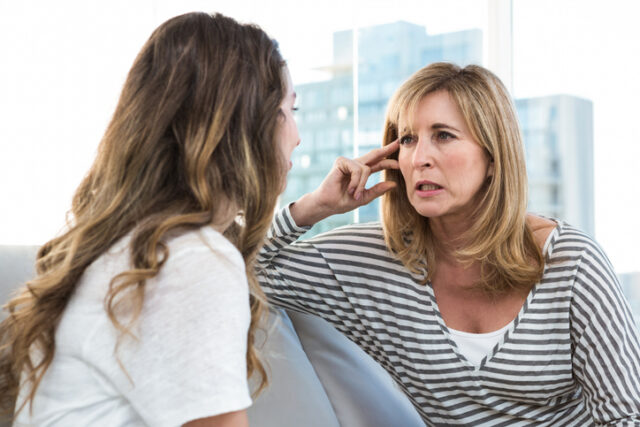The relationship between mums and their kids is precious, and it’s one that can’t be replicated and replaced.

However, not everyone has a close, supportive relationship with their mother, and that has an effect on them. Not only do they miss out on that special bond with the woman who brought them into the world, but they also tend to struggle in their relationships with other people because of it. After all, if you’re lacking the one person who’s meant to have your back through thick and thin, how on earth are you meant to get close to anyone else? Here are some qualities you may recognise in yourself if you and your mum aren’t exactly close (which likely isn’t your fault, by the way, so try to cut yourself a bit of slack).
1. You don’t tend to get deep with people.

When you’ve grown up without that emotional closeness with your mum, getting close to other people can feel intimidating. Maybe you keep everyone at a distance, unsure of how to open up or even if it’s safe to do so. The idea of being vulnerable can be scary when you haven’t had that modelled for you. It’s tough to build trust and intimacy when you’re worried about getting hurt or disappointed again. If this sounds like you, it might be worth trying to push through those walls, even if just a little at a time. Building deeper connections takes time, but it’s possible – and worth it.
2. You put other people’s needs before your own.

Growing up in an environment where your own needs weren’t always important (or even acknowledged) can make you fall into the habit of focusing on everyone else first. It might feel natural to put your friends, family, or colleagues ahead of yourself, even if it leaves you feeling drained. You might feel like it’s your responsibility to take care of everyone, and that means neglecting your own well-being. It’s important to realise that it’s okay to look after yourself, too. You can’t pour from an empty cup, so if you’re always giving without replenishing your own energy, you’ll soon run out of steam.
3. Boundary-setting isn’t your strong suit.

If boundaries weren’t respected in your relationship with your mum, you might struggle to set them with other people. Whether it’s in your job, with friends, or in romantic relationships, asserting your needs can feel uncomfortable or even guilt-inducing. You might be passive in these situations because you’re scared of drama or upsetting someone. Setting boundaries is so important for your mental and emotional health, though, and learning to do so is a step towards healthier relationships. Remember, it’s not selfish to say no when you need to – it’s necessary.
4. You feel guilty about everything all the time.

Guilt can be a heavy burden, especially if you grew up with a tough relationship with your mum. You might find yourself constantly questioning your actions, even when you haven’t done anything wrong. It could be that you’re always feeling like you’re letting someone down or not meeting expectations, even when those expectations aren’t even realistic. It’s important to recognise that not everything is your fault, and it’s okay to give yourself a break sometimes.
5. You get defensive when anyone criticises you, even constructively.

If you grew up with a mum who was overly critical or dismissive, it’s natural that you’d develop a sensitivity to criticism. When someone offers feedback, even if it’s meant to help you grow, you might react defensively instead of seeing it as a chance to improve. It’s hard to hear criticism when it feels like you’ve been criticised your whole life, which makes sense, but being able to take constructive feedback without feeling personally attacked is a valuable skill. It might take practice, but it’s worth working on so you can grow and strengthen your relationships.
6. You’re not very open about how you’re feeling at any given time.

If emotional expression was met with anger or rejection when you were younger, it might have become a habit to keep your feelings to yourself. Bottling up emotions can feel safer than risking the rejection or judgement that you might have experienced before. But the downside is that it becomes harder to communicate openly, even with the people who care about you. Letting people in can be scary, but it’s the only way to form deeper, more meaningful connections. Try to find small ways to start opening up, even if it’s just sharing a little more with someone you trust.
7. You doubt your self-worth.

A bad relationship with your mum can leave you questioning your value. Maybe you’ve struggled with feeling good enough, constantly comparing yourself to other people and wondering if you’ll ever measure up. It’s easy to lose confidence when you don’t have someone in your corner reminding you of your worth. But here’s the truth: you are worthy of love and respect, no matter what. Your value isn’t determined by anyone’s actions but your own, and learning to believe in yourself is a key part of healing.
8. You go out of your way to avoid conflict and confrontation.

If conflict wasn’t handled well in your home growing up, it’s understandable that you’d avoid confrontation altogether. The idea of facing it can feel overwhelming, and you might convince yourself that it’s easier to just let things slide. But ignoring issues doesn’t solve anything; it just lets resentment build up. It’s healthier to face issues head-on and address them as they arise. You don’t have to do it all at once, but taking small steps towards being more comfortable with confrontation will improve your relationships.
9. You put up walls to protect yourself.

If you’ve been hurt in the past, especially by someone who was supposed to love you unconditionally, it’s only natural to build emotional walls to protect yourself. These walls might make it harder to trust and connect with people, even if you care about them. The fear of getting hurt again can be so overwhelming that you push people away before they get the chance to hurt you. But eventually, those walls can become a barrier to deeper connections. Learning to lower them, even just a little, can help you build stronger, more trusting relationships.
10. You need a lot of external validation to feel good about yourself and your decisions.

If you didn’t get the affirmation you needed from your mum, it’s no surprise you might seek validation from other people as an adult. You might find yourself constantly looking for praise or approval from those around you to feel good about yourself. Whether it’s through your achievements, your appearance, or your actions, external validation can feel like the only way to boost your self-worth. In reality, you don’t need anyone’s approval to be enough. You are worthy as you are, and learning to believe that internally is a huge step towards self-acceptance.
11. Being a good friend sometimes feels like a struggle.

If you didn’t have a solid emotional support system growing up, it can be tough to be a good friend now. You might feel emotionally drained after social interactions, even if they don’t seem particularly demanding. This can leave you feeling isolated or like you’re unable to give as much as you’d like. It’s important to recognise that being a good friend doesn’t mean always giving – it means showing up when it matters, being there for each other, and giving space for both of you to grow.
12. Bringing yourself to ask for help when you need it is like getting blood from a stone.

If asking for help wasn’t something you were encouraged to do growing up, it can feel impossible to reach out to other people as an adult. You might worry that your needs won’t be met or that you’ll be rejected. It’s hard to ask for help when you’ve learned to rely on yourself for so long, but it’s okay to lean on other people sometimes. Asking for support when you need it is a sign of strength, not weakness. You don’t have to do everything on your own.
13. Your fear of abandonment looms large.

Having a tough relationship with your mum can leave you with a deep-rooted fear of abandonment. You might find yourself constantly worrying that people will leave you, or going out of your way to prevent it from happening, even if it means sacrificing your own needs. This fear can affect your relationships, leading to anxiety and overthinking. It’s important to recognise that not everyone will abandon you, and learning to trust people is a gradual process. You deserve stable, loving relationships, and you don’t have to push people away to protect yourself.




